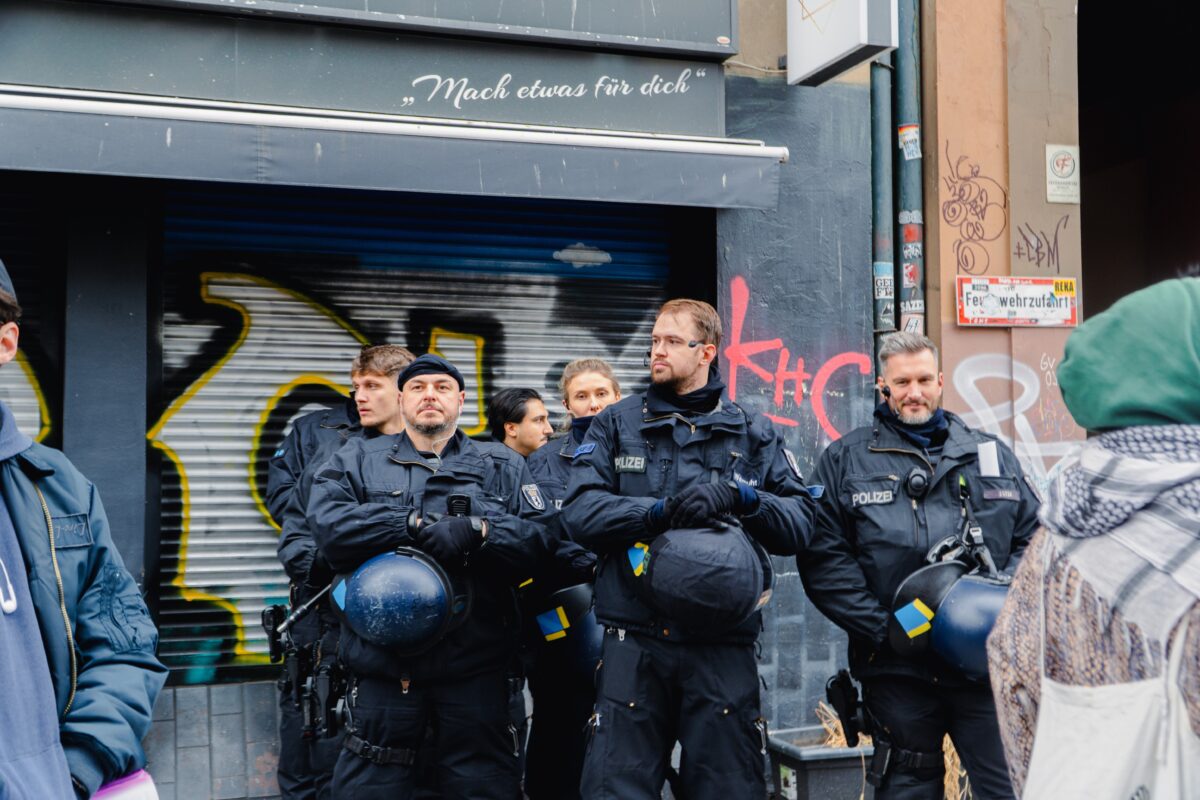Police-perpetrated violence at protests in solidarity with Palestinians escalated to new extremes this past weekend, with Berlin police demanding a premature end to the Sunday, October 6th demonstration. This was promptly followed by the exertion of excessive force against participants.
Police officers with visored helmets, bullet-proof protective armour, pepperspray, full riot gear are now commonplace at rallies in Berlin. According to the Berliner Polizei’s own report, Sunday saw them ‘protect’ several demonstrations across the city with some 500 such personnel. Video footage and witness documentation circulating on social media tell a different story.
No sooner than police had instructed participants to disperse via loudspeaker, several were caught on camera evidently ‘hyping themselves up’ before charging indiscriminately into a crowd of protesters, one of whom appeared to be making an effort to deescalate the situation, telling others to ‘back up’.
As in many countries, the police in Germany can legally implement force on behalf of the state—so long as the applied measures are selected with the intent to cause as little harm as possible and the successive damage not be disproportional. Any shred of belief that the Berlin police were acting within the boundaries of their right to violence dissolves when confronted with a video of officers dragging an individual who had been using a wheelchair across the ground and into a van. One commenter on the instagram clip claims to recognise the man from his local mosque, describing him as ‘Pure hearted’.
Following the registered event’s abruptly imposed end, Palestinians and Allies, Palestine Speaks, Student Coalition Berlin and the Alliance of International Feminists released a joint statement identifying the man as being 68 years old. The statement recounts several other injuries resulting from police measures; per paramedics on the scene, one participant received a head injury resulting in loss of consciousness and a woman was pushed to the ground with such force that she suffered a broken arm. Other injuries included facial trauma to the eyes, broken noses and bleeding lips. Police are also said to have prevented paramedics from administering medical treatment in some cases.
During the escalation, police were also recorded gripping a protester by the neck before restraining him against the side of a van and punching the back of his head, shielding—physically and with threats of using pepperspray—colleagues as they repeatedly punched a participant, hindering filming. Finally, they used large quantities of pepperspray while pinning an individual who did not appear to be resisting to the ground.
Alongside criticisms of Germany’s shortcomings in freedom of expression and assembly following October 7th, 2023, Amnesty International’s 2024 report accuses Germany of leaving police violence unchecked. Sunday’s events are merely one example of a widespread problem. It was only earlier this year that a government position responsible for police complaints was created at the federal level. Generally speaking, complaints against police officers are processed by other police officers.
For victims and witnesses who wish to file a report after experiencing police violence, KOP (Kampagne für Opfer rassistischer Polizeigewalt, Campaign for Victims of Racist Police Violence) recommends doing so via the public prosecutor’s office (Staatsanwaltschaft). But with charges and penalties being brought against police officers in only 1.8% of cases of assault (compared to 16% overall), the odds of atonement and justice being realised through available channels do not appear to favour victims.




